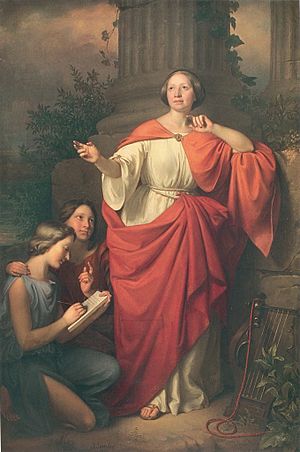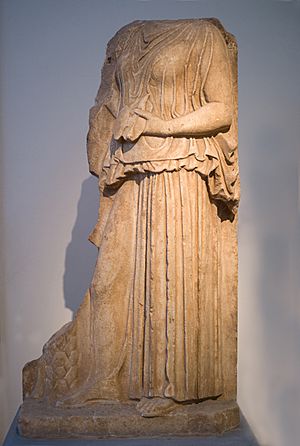Diotima of Mantinea facts for kids
Quick facts for kids
Diotima of Mantinea
|
|
|---|---|

Jadwiga Łuszczewska, who used the pen name Diotima, posing as the ancient seer in a painting by Józef Simmler, 1855
|
|
| Era | Ancient philosophy |
| Region | Western philosophy |
| School | Classical Greek |
|
Notable ideas
|
Platonic love |
Diotima of Mantinea ( Greek: Διοτίμα; Latin: Diotīma) was a wise woman from ancient Greece. She is a very important character in one of Plato's famous books, called the Symposium. In this book, she teaches Socrates about love. Her ideas about Eros (love) are believed to be the origin of what we now call Platonic love. This is a deep, non-physical kind of love that focuses on ideas and wisdom.
Contents
Who Was Diotima?
The Meaning of Her Name
The name Diotima means "one who honors or is honored by Zeus," who was the king of the gods. She was also called "Mantinikê" (Mantinean), which suggests she was from a place called Mantinea. This part of her name also sounds like "mantis", which means "prophet" or "seer." This hints that she might have had special abilities to see the future.
Diotima as a Seer or Priestess
Many scholars believe Diotima was a priestess or a seer. This is because she gave advice to the Athenians about special offerings that helped delay a terrible plague. Her teachings about love also use words related to prophecy, purification, and spiritual ceremonies. The name "Mantinikê" can also be seen as a clever play on words, meaning "Diotima, prophet of victory."
Was Diotima a Real Person?
It's not clear if Diotima was a real person or a character created by Plato. She is only mentioned in Plato's Symposium. However, many characters in Plato's books were real people from ancient Athens. Some scholars in the past thought Plato might have based Diotima on Aspasia, a very intelligent woman who was a companion of Pericles.
Plato says that Socrates learned from Diotima more than once. Her ideas about love are unique, even though they connect to Socrates's and Plato's thoughts. This makes some people think she might have been a real, independent wise woman. However, since no other ancient writings mention her, others believe she was a fictional character used by Plato to share his ideas.
Diotima's Role in Plato's Symposium
Discussing the Meaning of Love
In Plato's Symposium, a group of friends gather for a party and discuss the meaning of love. Socrates tells everyone that when he was young, he learned about "the philosophy of love" from Diotima. He describes her as a seer or priestess. Socrates also says that Diotima helped delay the Plague of Athens through her advice.
Diotima's Teachings on Love
Diotima explains to Socrates that love is not simply beautiful or good, as others at the party had suggested. She says that love (Eros) is the child of "resource" and "poverty." This means love is always seeking something it doesn't have.
According to Diotima, love drives people to seek beauty. At first, a person might be drawn to physical beauty, like beautiful bodies. But as someone grows wiser, they learn to appreciate spiritual beauty, like beautiful souls and minds.
The Path to True Love and Wisdom
For Diotima, the best way to use love for other people is to guide your mind toward loving wisdom, which is philosophy. A beautiful person can inspire your mind and soul, leading you to think about deeper, spiritual things. You start by recognizing someone's beauty, then you appreciate beauty itself, separate from any one person. Finally, you consider the divine, which is the source of all beauty, and you learn to love that divinity.
She explains this journey:
. . . and directing his gaze from now, on towards beauty as a whole, he should turn to the great ocean of beauty, and in contemplation of it give birth to many beautiful and magnificent speeches and thoughts in the abundance of philosophy. (Diotima to Socrates in Plato's Symposium.)
See also
 In Spanish: Diotima para niños
In Spanish: Diotima para niños


